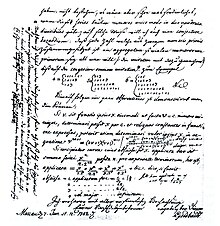 Letter from Goldbach to Euler dated on 7 June 1742 (Latin-German)[1] | |
| Field | Number theory |
|---|---|
| Conjectured by | Christian Goldbach |
| Conjectured in | 1742 |
| First proof by | Harald Helfgott |
| First proof in | 2013 |
| Implied by | Goldbach's conjecture |
In number theory, Goldbach's weak conjecture, also known as the odd Goldbach conjecture, the ternary Goldbach problem, or the 3-primes problem, states that
- Every odd number greater than 5 can be expressed as the sum of three primes. (A prime may be used more than once in the same sum.)
This conjecture is called "weak" because if Goldbach's strong conjecture (concerning sums of two primes) is proven, then this would also be true. For if every even number greater than 4 is the sum of two odd primes, adding 3 to each even number greater than 4 will produce the odd numbers greater than 7 (and 7 itself is equal to 2+2+3).
In 2013, Harald Helfgott released a proof of Goldbach's weak conjecture.[2] The proof was accepted for publication in the Annals of Mathematics Studies series[3] in 2015, and has been undergoing further review and revision since; fully-refereed chapters in close to final form are being made public in the process.[4]
Some state the conjecture as
- Every odd number greater than 7 can be expressed as the sum of three odd primes.[5]
This version excludes 7 = 2+2+3 because this requires the even prime 2. On odd numbers larger than 7 it is slightly stronger as it also excludes sums like 17 = 2+2+13, which are allowed in the other formulation. Helfgott's proof covers both versions of the conjecture. Like the other formulation, this one also immediately follows from Goldbach's strong conjecture.
- ^ Correspondance mathématique et physique de quelques célèbres géomètres du XVIIIème siècle (Band 1), St.-Pétersbourg 1843, pp. 125–129.
- ^ Cite error: The named reference
:0was invoked but never defined (see the help page). - ^ "Annals of Mathematics Studies". Princeton University Press. 1996-12-14. Retrieved 2023-02-05.
- ^ "Harald Andrés Helfgott". webusers.imj-prg.fr. Retrieved 2021-04-06.
- ^ Weisstein, Eric W. "Goldbach Conjecture". MathWorld.